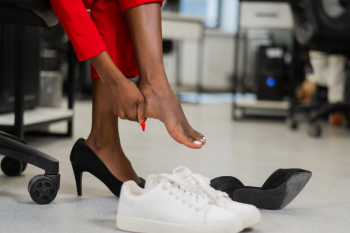Webster (281) 316-3338
Alvin (281) 331-3525
Webster (281) 316-3338
Alvin (281) 331-3525

Plantar fasciitis is a common foot condition that causes inflammation of the plantar fascia, the thick band of tissue that runs along the bottom of the foot, connecting the heel to the toes. The main symptom is sharp heel pain, especially when taking the first few steps in the morning or after prolonged periods of sitting. The pain tends to decrease with activity but may return after standing for long periods. Common causes of plantar fasciitis include repetitive strain from activities like running, standing for extended periods, or wearing improper footwear. Other risk factors include obesity, tight calf muscles, and flat feet. To diagnose plantar fasciitis, a doctor will conduct a physical examination and may ask about activity levels and footwear. In some cases, X-rays or an MRI scan may be used to rule out other conditions. Plantar fasciitis can cause severe pain and discomfort. If you have heel pain, it is suggested that you promptly consult a podiatrist who can accurately diagnose and treat plantar fasciitis.
Plantar fasciitis is a common foot condition that is often caused by a strain injury. If you are experiencing heel pain or symptoms of plantar fasciitis, contact Dr. Douglas Webb from Texas. Our doctor can provide the care you need to keep you pain-free and on your feet.
What Is Plantar Fasciitis?
Plantar fasciitis is one of the most common causes of heel pain. The plantar fascia is a ligament that connects your heel to the front of your foot. When this ligament becomes inflamed, plantar fasciitis is the result. If you have plantar fasciitis you will have a stabbing pain that usually occurs with your first steps in the morning. As the day progresses and you walk around more, this pain will start to disappear, but it will return after long periods of standing or sitting.
What Causes Plantar Fasciitis?
There are some risk factors that may make you more likely to develop plantar fasciitis compared to others. The condition most commonly affects adults between the ages of 40 and 60. It also tends to affect people who are obese because the extra pounds result in extra stress being placed on the plantar fascia.
Prevention
There are a variety of treatment options available for plantar fasciitis along with the pain that accompanies it. Additionally, physical therapy is a very important component in the treatment process. It is important that you meet with your podiatrist to determine which treatment option is best for you.
If you have any questions, please feel free to contact one of our offices located in Alvin and Webster, TX . We offer the newest diagnostic and treatment technologies for all your foot care needs.

An ankle fracture is a break in one or more of the bones forming the ankle joint, often caused by twisting injuries, falls, or direct trauma. While immediate pain, swelling, and difficulty walking are obvious challenges, the effects of an ankle fracture can ripple far beyond the injury itself. Recovery often demands immobilization, targeted exercises and stretching, and lifestyle adjustments, which can disrupt daily routines, work, and recreational activities. Prolonged periods of limited mobility can also impact mental well-being, making the injury feel even more overwhelming. If you have sustained an ankle fracture, it is suggested that you have ongoing appointments with a podiatrist who can help manage both the physical and long-term impacts of an ankle fracture.
Broken ankles need immediate treatment. If you are seeking treatment, contact Dr. Douglas Webb from Texas. Our doctor can provide the care you need to keep you pain-free and on your feet.
Broken Ankles
A broken ankle is experienced when a person fractures their tibia or fibula in the lower leg and ankle area. Both of these bones are attached at the bottom of the leg and combine to form what we know to be our ankle.
When a physician is referring to a break of the ankle, he or she is usually referring to a break in the area where the tibia and fibula are joined to create our ankle joint. Ankles are more prone to fractures because the ankle is an area that suffers a lot of pressure and stress. There are some obvious signs when a person experiences a fractured ankle, and the following symptoms may be present.
Symptoms of a Fractured Ankle
If you suspect an ankle fracture, it is recommended to seek treatment as soon as possible. The sooner you have your podiatrist diagnose the fracture, the quicker you’ll be on the way towards recovery.
If you have any questions, please feel free to contact one of our offices located in Alvin and Webster, TX . We offer the newest diagnostic and treatment technologies for all your foot care needs.

A high ankle sprain is an injury to the ligaments that connect the tibia and fibula, the two bones in the lower leg, just above the ankle. Unlike a typical ankle sprain, which affects the ligaments surrounding the ankle joint, a high ankle sprain involves syndesmosis, the connective tissue between the two bones. This injury often occurs during activities that involve twisting or turning motions, such as running, football, or basketball, where the foot is planted, and the leg twists forcefully. Symptoms of a high ankle sprain include pain above the ankle, swelling, bruising, and difficulty walking or bearing weight on the affected leg. The pain may worsen with movement or when the foot is rotated. If you have sprained your ankle, it is suggested that you promptly contact a podiatrist who can offer the best treatment for the type of ankle sprain it is.
Ankle sprains are common but need immediate attention. If you need your feet checked, contact Dr. Douglas Webb from Texas. Our doctor can provide the care you need to keep you pain-free and on your feet.
How Does an Ankle Sprain Occur?
Ankle sprains take place when the ligaments in your ankle are torn or stretched beyond their limits. There are multiple ways that the ankle can become injured, including twisting or rolling over onto your ankle, putting undue stress on it, or causing trauma to the ankle itself.
What Are the Symptoms?
Preventing a Sprain
Treatment of a Sprain
Treatment of a sprain depends on the severity. Many times, people are told to rest and remain off their feet completely, while others are given an air cast. If the sprain is very severe, surgery may be required.
If you have suffered an ankle sprain previously, you may want to consider additional support such as a brace and regular exercises to strengthen the ankle.
If you have any questions please feel free to contact one of our offices located in Alvin and Webster, TX . We offer the newest diagnostic and treatment technologies for all your foot and ankle needs.